Balance
I’m beginning to think it’s not gardening I like so much, it’s nature. Is that because the tomato plants have succumbed to an unknown disease and the cucumber has powdery mildew? Maybe. It’s too late for organic solutions – they work best as a preventative rather than a cure – and I’m not about to spray fungicide, so I’m left with an ugly sprawl of discoloured leaves germinating fungal spores.
Of course, the culprit could be the tablecloth I left in the laundry at Christmas and kept meaning to wash (if anyone knows how to get black mould out of a cotton tablecloth please let me know) but I suspect the mildew would have developed anyway.
The cucumbers and tomatoes are still growing, so do I sacrifice the meagre crop and pull up the unsightly plants, or turn a blind eye to ugliness and hope for more fruit?
One tomato plant produced a huge crop in late spring, but that was before the frangipani had fully developed its dense cover of leaves and flowers. The rest of the plants have struggled, and I hate seeing them like this.
The plants on the sunny side of the house, tucked down a narrow passageway between this house and our neighbour, have done better but overwatering was probably the cause of their demise. Trying too hard again.
Is there a deep-seated craving for beauty in my soul? More likely I simply inherited the ‘tidy gene’ my sister talks about – a gene that spells the death of creativity yet comes in pretty handy for the final edit (as I’m discovering now.)
It’s a constant battle between form and function in this tiny concrete patio, where growing vegetables under the shade of a spreading frangipani has tested my patience. Of course, at somewhere like Villandry in France they’ve got both. Such opulent manicured splendour is not for me. It’s too rigid, too strictly enforced. Too beautiful perhaps? I prefer something less structured.
Even in the wildest parts of Australia there’s something inherently beautiful about nature left untouched. How to reconcile then the desire to garden and grow things with that ideal of pristine wild beauty? Minimum intervention I suppose.
I long to live where that might be possible, where nature has the upper hand and man’s intervention in the built environment is as unassuming as possible. My ideal is a large plot of land and a little house, with water tanks, solar power and a renewable copse of trees to supply logs for the fire. It’s a romantic dream, a folly that may never happen yet it sustains me whenever I despair of this concrete jungle that is Sydney.
Odd that I set out to write about balance and ended up writing about longing. That suggests there’s not enough balance in my own life right now. More nature please, less city.
Maybe that’s what appeals about living here in Australia, the vast tracts of native bush that are seemingly untouched, developing the way nature intended. Sometimes my fanciful musings get out of hand and I imagine humanity wiping itself out on this extraordinarily beautiful planet and leaving it to spin through the void, its beauty no longer appreciated by us humans and no longer spoiled by our presence.
What do I believe in? I believe in nature. I also believe in the quiet power of kindness. There’s something about the silence of nature that plays like music for me, only of course it isn’t silence it’s the sound of the natural world living, breathing and going about it’s quiet business. I’d like to emulate that ease and peace – it soothes my soul more than any amount of man-made music – and if I combine that with kindness I reckon there’s a formula for a happy life.
Hah. If only I could live up to my fanciful musings. Kindness isn’t always top of my list (sometimes its not even on the list) and it should be. Kindness is as kindness does. It carries its own inherent beauty, like the truth Keats wrote about, and it has practical benefits too, much like the tomato plant still growing on the side of the house.
I think kindness is a quality worth cultivating.

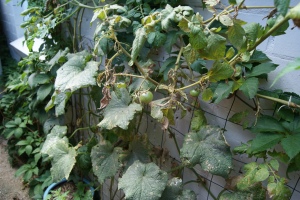
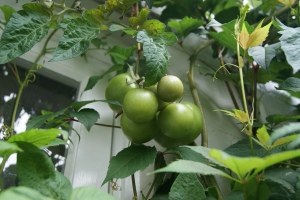
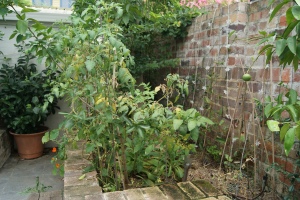
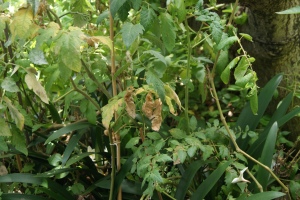

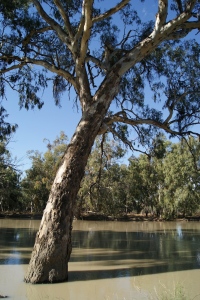
I think our longings help nudge us toward balance. Unless we’re complete hedonists:).
LikeLike
Ah yes, a hedonist wouldn’t care about balance, which I suppose is one way of finding out if you have any hedonistic tendencies!
LikeLike
Nature, kindness, balance, peace–I like how you think, Deb.
LikeLike
Thank you, it’s lovely to hear from a like minded soul.
LikeLike
Being away probably upset your veggies, they missed you. Next year will be better!
LikeLike
You’re probably right Barbara, they do need nurturing don’t they?
LikeLike
Enjoyed your musings about balance and honesty about kindness. Sounds very familiar! 😉
Have you tried 60/40% water/milk mix as a fungicide? Best used preventatively, it might still help – you don’t have anything to lose. 🙂
LikeLike
Thanks for that suggestion Eliza. I have tried it in the past but then, as now, I applied it far too late for it to be of any use. Next year (and I’ve said that before!) I will try to work preventatively!
LikeLike
Deb I think you are just plain too hard on yourself!! Everything has a cycle – veggies included. My tomatoes thrived until I gave them a dose of fish fertiliser, for some reason they didn’t like it, so….no more tomatoes! We keep trying though, as you do. Is it nature or nurture that we enjoy – or both?? More to muse about….
LikeLike
Tomatoes are such fickle things and relatively cheap to buy I have NO idea why I keep trying to grow them! Nature, nurture or the local farmer’s market?? I know where I’m heading!
LikeLike
Beautifully written as always Deb. I’ll pass along what my best friend (also an Aussie) taught me about mildew on cucumbers, melons and squash plants: immediately remove all of the mildew covered leaves, taking care not to damage the vine itself. Even if all you are left with is a long scraggily vine with just a few healthy leaves at the tip, the plant will live and continue to produce (after it has a short period of recovery). We did this in her garden last year and behold, it worked! Granted, the vines trailed along in a rather unsightly manner, but the growing tips were healthy and we were still able to harvest some very delicious cukes & squash for quite some time afterwards. I hope this helps. 🙂
LikeLike
Thanks so much for that advice. If only I’d waited patiently for these wise words to arrive instead of ripping out the mildewed vine I might have benefited from such a sensible suggestion. Drat and curses! Still, I’m gathering plenty of advice for next year 🙂
LikeLike